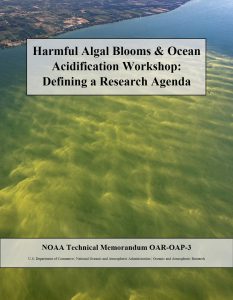
NOAA’s Ocean Acidification Program (OAP) and NCCOS have published the proceedings of the virtual Harmful Algal Blooms and Ocean Acidification Workshop in a NOAA Technical Memorandum (OAR-OAP-3). Over 70 scientists, managers and stakeholders met August 11-13, 2020 to identify needs and priorities to advance research on ocean acidification (OA) and harmful algal blooms (HABs) as co-stressors in coastal ecosystems.
Understanding OA and HAB interactions is identified as a national priority. OAP and NCCOS partner to better understand OA and HABs as threats to marine ecosystems and human communities in the coastal zone. While research to date has provided insights into the many factors that regulate HAB dynamics, toxicity, and impacts, only a few of these have included OA. Similarly, OA studies have examined ocean biogeochemistry and impacts to marine resources and economies and have started expanding into multi-stressor research studies (e.g., hypoxia and warming), but few include HABs.
Recent studies indicate that increased CO2 concentrations support higher phytoplankton densities and that carbonate chemistry (e.g., pCO2 and pH) has variable effects on growth rate and cellular toxin production in different HAB species and strains. There is a growing need to understand OA and HAB interactions and their cascading impacts to coastal ecosystems, communities, and economies. This workshop was convened to advance integrated research on OA and HABs to inform coastal management decisions.
Preceding the workshop, several experts in the field presented a series of webinars discussing the current understanding of OA-HAB interactions in various coastal regions, estuaries, and the Great Lakes. Webinar speakers were asked to share their thoughts about the greatest knowledge gaps and “grand challenges” related to OA-HAB interactions; these are listed in the “OA & HABs Across the U.S.: Laying the Scientific Foundation” section of the report (pp. 9-14). Participants had the opportunity to work in groups to identify regional information knowledge gaps and needs, and relevant products to meet the needs identified in the Great Lakes, East Coast, Gulf of Mexico, West Coast, and Alaska regions.
The overarching need that emerged across the workshop is that future research should include a holistic approach to multi-stressor ecosystem research. Several other common research needs were identified, including:
-
-
- Recognition of OA as a multi-stressor involving a host of different chemical species (e.g., pCO2, pH, CO32-), each of which may have different impacts to HABs.
- Concurrent evaluation of OA with other environmental conditions such as eutrophication and hypoxia, which also have impacts on HABs.
- Basic information on OA impacts on HABs at multiple levels: species, population, community, food web, and ecosystem.
- Expanding studies to include important resource species, such as shellfish, and coastal economies and social systems.
- Co-located monitoring of OA and HABs to discern relationships and build understanding.
-
With sufficient understanding of how OA and HABs interact, predictions, vulnerability assessments, and other products can be produced to communicate potential impacts and risks. Workshop participants identified ideal research products that will address cross-regional management needs for OA and HABs.
